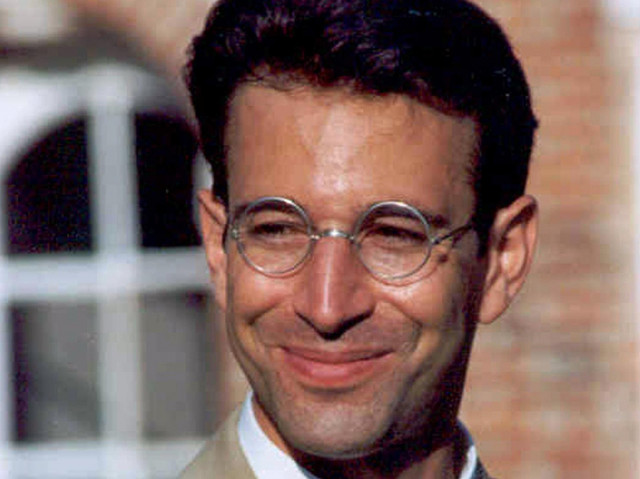SC to hear Daniel Pearl murder case appeal on June 1
A three-judge special bench will hear the Sindh government and Pearl's parents' appeal against the SHC judgment

PHOTO: AFP
Chief Justice of Pakistan Gulzar Ahmed constituted a three-judge special bench that would hear the Sindh government and the appeal of Daniel Pearl's parents against the Sindh High Court's (SHC) judgment.
The special bench will hear the plea seeking suspension of the SHC's judgment regarding acquitting/ releasing the accused in Pearl's murder case
On April 2, 2020, the SHC had commuted the death sentence of Ahmed Omar Saeed Sheikh - the man convicted of kidnapping and murdering American journalist Daniel Pearl in 2002 - to a seven-year sentence.
The SHC had also acquitted three others who had been awarded life imprisonment in the case. The order came almost two decades after they were found guilty and subsequently jailed.
The slain journalist's parents had approached the Supreme Court against the Sindh High Court’s verdict.
Two criminal petitions have been filed by renowned lawyer Faisal Siddiqi on behalf of Pearl's parents - Ruth Pearl and Judie Pearl -against the acquittal and release of the four accused.
“The decision by the Sindh High Court to free the men in the murder of Daniel Pearl is a complete miscarriage of justice. It is a defining case for the Pakistani state and its judicial system, involving freedom of the press, the sanctity of every life, freedom from terror and the manifestation of a welcoming and safe Pakistan to the world. Rarely has any court case embodied and risked such fundamental values,” said the lawyer.
The petition states that the SHC “failed to note that this was a brutal murder” and a result of international terrorism, and the principle of the standard of proof, as well as the benefit of the doubt in cases of international terrorism, has to be applied keeping in context that the nature and type of evidence available in such terrorism cases cannot be equated with cases involving non-terrorism crimes.
“Therefore, it is obvious and apparent that the impugned judgment is clearly erroneous because it is fundamentally based on a misinterpretation of law and misreading of the entire record of Special Case No.26 of 2002,” stated the petition, adding that the impugned judgment is liable to be set aside.
It further alleges that the SHC erred in holding that no evidence has been brought on record by the prosecution to link any of the accused persons to the murder of Pearl.
“It is submitted that a bare perusal of the entire record of Special Case No.26 of 2002 reveal that there is a plethora of incriminating evidence, both forensic as well as oral, which proves that murder of the deceased person has been committed and that all the accused persons have aided and abetted the murder of the deceased person.”
The petition further submitted maintained that the SHC further erred in failing to take into consideration that Ahmad Omar Sheikh has a history of involvement in international terrorism.
“It is also submitted that SHC erred in failing to consider the proforma of confessional statements and the examination-in-chief of the judicial magistrate, wherein it has been categorically stated that the confessional statements have been made voluntarily,” it added.
The petition further states that keeping in mind the arguments, the judgment is fundamentally based on a “misinterpretation of the law” and on a “misreading and selective reading” of the entire record of the case.
Siddiqi further added in the petition that the provincial high court’s judgement has itself held that the present case is a “very sensitive case where a foreign journalist was murdered in the most brutal circumstances that would have spread terror amongst other foreigners in Pakistan and the journalist community as a whole”.
“Therefore, in light of its own finding and the strong incriminating evidence establishing the case for kidnapping for ransom of the deceased person, the Sindh High Court has erred in giving the aforementioned findings,” the petition submitted in the apex court further maintains.



















COMMENTS
Comments are moderated and generally will be posted if they are on-topic and not abusive.
For more information, please see our Comments FAQ